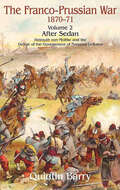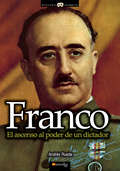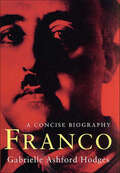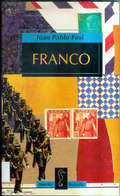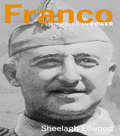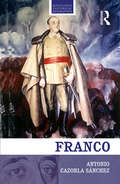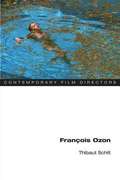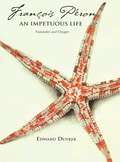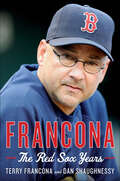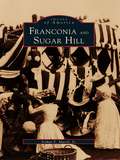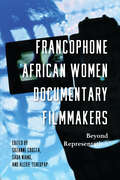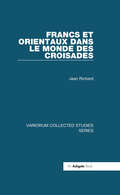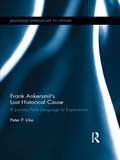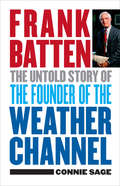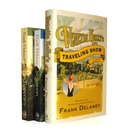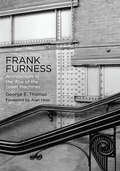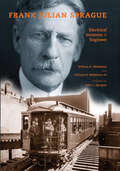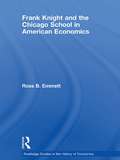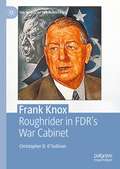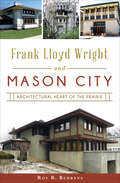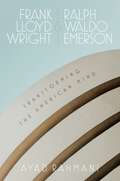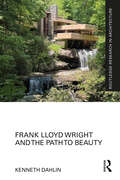- Table View
- List View
Franco-Prussian War 1870–1871, Volume 1: The Campaign of Sedan: Helmuth Von Moltke and the Overthrow of the Second Empire (Franco-prussian War 1870-1871 Volume 1: The Campaign Of Sedan Ser. #1)
by Quintin BarryThe first volume of this comprehensive study of the Franco-Prussian War presents a detailed account of Germany Confederation&’s decisive victory over France. In the first part of this two-volume military history, Quintin Barry examines the war against the French Imperial Army waged by the armies of the German Confederation, directed by that supreme military mind, Helmuth von Moltke. Barry places Moltke and his strategic planning in the context of the European balance of power following the ending of the Austria Prussian War in 1866. He then explores the initial mobilization and deployment of the armies in 1870. All the battles of this opening round of the war are described in detail, including Weissenburg, Worth, Spicheren, Borny-Colombey, Mars la Tour, Gravelotte, Beaumont and, of course, Sedan. The book ends as the Second Empire of Napoleon III lies defeated, crushed by the German armies. Barry has made full use of an extensive number of German and French language sources. His detailed text is accompanied by a number of black and white illustrations and newly drawn battle maps. Orders of battle are also provided.
Franco-Prussian War 1870–1871, Volume 2: After Sedan: Helmuth Von Moltke and the Defeat of the Government of National Defence (Franco-prussian War 1870-1871 Volume 2: After Sedan Ser. #2)
by Quintin BarryThe second volume of this comprehensive military history examines the fall of the Second French Empire and the founding of a unified Germany.Helmuth von Moltke&’s victory over France in the Battle of Sedan resulted in the capture of Napoleon III. But the war against the Government of National Defense presented quite different problems to von Moltke and his staff.Although the Siege of Paris loomed large during the second phase of the war, historian Quintin Barry fully explores events in other parts of France, including the siege of Strasbourg, the activities of the Francs Tireurs, the investment of Metz, and the battle against the French armies of the Loire, the North, and the East. As with the first volume of this study, Barry has made full use of an extensive number of German and French language sources. His detailed text is accompanied by a number of black and white illustrations and newly drawn battle maps. Orders of battle are also provided.
Franco. El ascenso al poder de un dictador (Historia Incógnita)
by Andrés RuedaUna novedosa biografía de Francisco Franco basada en una rigurosa investigación histórica apoyada en una espectacular cantidad de material gráfico. Conozca en detalle todos los episodios clave de su carrera militar, del alzamiento y de la Guerra Civil, que le condujeron a convertirse en el Caudillo. Descubra también la faceta más humana de un dictador atormentado, inseguro y oportunista, que gracias a su astucia y personalidad llegó a convertirse en la figura más determinante de la historia de España durante el siglo XX Esta obra, finalista del premio Espejo de España, es una novedosa aproximación a la figura de Francisco Franco desde dentro. El psiquiatra Andrés Rueda se adentra en la biografía del dictador para rebuscar los episodios clave de su vida, las consecuencias que tuvieron en la forma de actuar y pensar de Franco, y cómo repercutieron esos traumas en la historia de España. Una investigación histórica y psicológica apoyada con una espectacular cantidad de material gráfico, que incluyen fotografías desconocidas, donde Andrés Rueda analiza los hechos, sus discursos, sus conversaciones, sus reacciones para trazar un perfil de este dictador con la máxima precisión y rigor y huyendo de los revisionismos interesados. Gracias a esta obra sin parangón, Franco, por primera vez, aparece en su faceta más humana, alejada de las brillantes distorsiones propagandísticas que rodearon su figura, en un intento, no de justificación, si no de explicación de por qué Franco se convirtió en la figura más determinante en la historia de España durante el siglo XX. A través de las páginas de esta obra, el lector descubrirá a un Franco acomplejado y atormentado, lleno de razones y sinrazones, inseguro y oportunista, un hombre mediocre y vulgar, que llegó a dirigir el destino de todo un país durante más de cuarenta años. Argumentos de venta - Se trata de la primera biografía de Franco que combina la historia rigurosa de su carrera y hechos militares, el análisis brillante de su compleja y atormentada personalidad y su ambición de dictador. - El título está repleto de citas bibliográficas, información inédita de diversas fuentes, prensa de la época... que documentan los hechos narrados dotándolos de rigor histórico. - Rueda presenta documentación y tésis inéditas sobre Franco, como la dudosa paternidad de su hija Carmen, la clave criptográfica usada en la comunicación del alzamiento o la foto de Franco sin bigote. - Franco permite entender de modo claro las razones y hechos que llevaron a un joven e inexperto general a autoproclamarse caudillo de España
Franco: A Concise Biography
by Gabrielle Ashford HodgesGeneral Francisco Franco came to prominence during the days of David Lloyd George and Woodrow Wilson and was able to cling to absolute political power until his death in 1975. Over his fifty-year career, he became one of the four dictators who changed the face of Europe during the twentieth century.Franco joined the Spanish Army when he was barely fifteen years old. In 1926 he became the youngest general in Europe and, driven by an astonishing sense of his own greatness, was recognized as sole military commander of the Nationalist zone during the Spanish Civil War. His ambition was always to hold on to the power that he had secured. In practice, this meant winning the Spanish Civil War and surviving the fall of the fascist regimes of Hitler and Mussolini and the international isolation that followed their defeat.But behind the military heroics and dexterous political footwork lay an insecure and vengeful man, wracked by contradictory impulses. Although fueled by a single-minded determination to succeed, he was full of self-doubt. A bold and sometimes inspirational soldier in Africa, he became an indecisive, hesitant military commander during the Civil War. Filled with a burning conviction that his destiny was bound up with the medieval kings of Spain and God Himself, he appeared shy, withdrawn, and humble. Ruthlessly intent on wiping out all political opposition, he denied heatedly that he was a dictator. A stubborn man, he could be remarkably flexible when it came to safeguarding his power.Gabrielle Ashford Hodges' psychological biography considers Franco's mental state, as well as his political motivation. In doing so, it succeeds admirably in getting under the skin of Europe's most enduring dictator.
Franco: Autoritarismo y poder personal (Punto De Lectura Ser. #Vol. 128)
by Juan Pablo FusiFranco. Autoritarismo y poder personal no es solo una de las más equilibradas biografías del personaje, sino una estupenda síntesis de lo que fueron cuarenta años decisivos en la historia de España. Juan Pablo Fusi despliega en este libro el doble mérito de haberse acercado a la figura de Franco con el rigor del historiador exigente, y el de haber sabido aproximarlo a sus lectores con el estilo de un relato apasionante.
Franco: Falange Espanola De Las Jons, 1936 76 (Profiles In Power)
by Sheelagh M. EllwoodAn excellent introduction to Franco's rise to power and his four decades as autocratic head of state in Spain.
Franco: The Biography of the Myth (Routledge Historical Biographies)
by Antonio Cazorla-SanchezGeneral Francisco Franco, also called the Caudillo, was the dictator of Spain from 1939 until his death in 1975. His life has been examined in many previous biographies. However, most of these have been traditional, linear biographies that focus on Franco’s military and political careers, neglecting the significance of who exactly Franco was for the millions of Spaniards over whom he ruled for almost forty years. In this new biography Antonio Cazorla-Sanchez looks at Franco from a fresh perspective, emphasizing the cultural and social over the political. Cazorla-Sanchez's Franco uses previously unknown archival sources to analyse how the dictator was portrayed by the propaganda machine, how the opposition tried to undermine his prestige, and what kind of opinions, rumours and myths people formed of him, and how all these changed over time. The author argues that the collective construction of Franco’s image emerged from a context of material needs, the political traumas caused by the Spanish Civil War (1936-1939), the complex cultural workings of a society in distress, political manipulation, and the lack of any meaningful public debate. Cazorla-Sanchez's Franco is a study of Franco’s life as experienced and understood by ordinary people; by those who loved or admired him, by those who hated or disliked him, and more generally, by those who had no option but to accommodate their existence to his rule. The book has a significance that goes well beyond Spain, as Cazorla-Sanchez explores the all-too-common experience of what it is like to live under the deep shadow cast by an always officially praised, ever present, and long lasting dictator.
Francois Ozon (Contemporary Film Directors)
by Thibaut SchiltIn just over a decade, François Ozon has earned an international reputation as a successful and provocative filmmaker. A student of Eric Rohmer and Jean Douchet at the prestigious Fémis, Ozon made a number of critically acclaimed shorts in the 1990s and released his first feature film Sitcom in 1998. Two additional shorts and eleven feature films have followed, including international successes 8 femmes and Swimming Pool and more recent releases such as Angel, Ricky, and Le refuge. Ozon's originality lies in his filmmaking style, which draws on familiar cinematic traditions (the crime thriller, the musical, the psychological drama, the comedy, the period piece) but simultaneously mixes these recognizable genres and renders them unfamiliar. Despite tremendous diversity in cinematic choices, Ozon's oeuvre is surprisingly consistent in its desire to blur the traditional frontiers between the masculine and the feminine, gay and straight, reality and fantasy, auteur and commercial cinema. Thibaut Schilt provides an overview of François Ozon's career to date, highlighting the director's unrestrained, voracious cinephilia, his recurrent collaborations with women screenwriters and actresses, and the trademarks of his cinema including music, dance, and the clothes that accompany these now typically Ozonian episodes. Schilt contextualizes Ozon's filmmaking within the larger fields of French filmmaking and international queer cinema, and he discusses several major themes running through Ozon's work, including obsessions with inadequate fathers, various types of mourning, and a recurring taste for "the foreign." The volume also includes an insightful interview with the director.
Francois Peron: An Impetuous Life
by Edward DuykerIn 1800 François Péron, an ambitious young medical student not long released from the French revolutionary army, gained a place as an assistant zoologist on Nicolas Baudin's expedition to Australian waters. As his colleagues either deserted or died, he would rise rapidly within the expedition's ranks and even write its official account. In doing so, Péron would seek to destroy Baudin's posthumous reputation. The expedition was famously marked by the vexed relationship between Péron and Baudin, but Péron's work, as a man of science, profoundly enhanced the achievements of the expedition: he seized valuable opportunities to pioneer zoological, oceanographic and ethnographic studies, and as an ecological observer was remarkably prescient. Edward Duyker's meticulously researched biography of Péron takes readers on an engaging and wide-ranging journey—from the heart of pre-revolutionary rural France, to the bitter fighting on the Rhineland front in 1793-94, to the late eighteenth-century Paris medical school, to landfalls in the Atlantic and the Indian Oceans, to the little-known shores of Van Diemen's Land and New Holland, and back into the very heart of Napoleon's Empire. This is both a balanced assessment of the difficult relationship between Péron and Baudin, and an analysis of the conduct of science during some of the most turbulent years in French history.
Francona: The Red Sox Years
by Dan Shaughnessy Terry FranconaTHE NEW YORK TIMES BESTSELLER. “Eloquent and dazzling,” the story of the legendary baseball manager’s tenure with the Boston Red Sox (Philadelphia Daily News).When Terry Francona took over as manager of the Boston Red Sox in 2004, the storied franchise hadn’t won a World Series championship in eighty-six years. Led by Francona, the team won two over the course of four years. During the full eight years of Francona’s tenure, the Red Sox were transformed from “cursed” into one of the most successful and profitable teams in baseball history—only to fall back to last place as soon as Francona was gone.Francona: The Red SoxYears lets readers in on the inner workings of the Red Sox clubhouse like no book has ever done before. From the highs of the World Series to the lows of the final months of the 2011 season—the most epic collapse of a team in baseball history—this book features the never-before-told stories about Sox fans’ favorite players, moments, wins, and losses.“A scorched-earth memoir . . . [that] touches fleetingly on steroid use, sabermetrics, and Michael Jordan’s stint in the minor leagues . . . but saves its heaviest artillery for the owners . . . [and] Theo Epstein backs him up.” —The New York Times Book Review“It’s not often that baseball aficionados and gossip gluttons can plunk down on a shared portion of outfield grass with the same book for an afternoon of readerly delight, but Francona can bridge those kinds of differences.” —The Boston Globe
Franconia and Sugar Hill (Images of America)
by Arthur F. March Jr.Although geographically contiguous and linked by their shared industries of early iron works and latertourism, Franconia and Sugar Hill are unique areas with distinct personalities that have developed over the years. The discovery of rich deposits of iron ore in Sugar Hill in the late 1700s and the establishment of iron works in Franconia brought the two areas together in a working partnership. The coming of the railroads brought tourism into both communities, with Franconia supplying the scenery with its mountains and far-famed Franconia Notch, and Sugar Hill rounding out the scenery with a generous offering of grand summer hotels. The sharing of the summer tourist industry was greatlybroadened by the development of skiing in the early part of the present century. Again, Franconia provided the major terrain and Sugar Hill provided many of the guest accommodations, including the first formal ski school at the prestigious Peckett's Inn. With all of its attributes, the area has attracted a number of notables, including movie star Bette Davis.
Francophone African Women Documentary Filmmakers: Beyond Representation (Studies in the Cinema of the Black Diaspora)
by Florence Martin Melissa Thackway Sheila Petty El Hadji Diop Felix Veilleux Suzanne Gauch Herve TchumkamFrancophone African Women Documentary Filmmakers is groundbreaking edited collection which explores the contributions of Francophone African women to the field of documentary filmmaking. Rich in its scope and critical vision it constitutes a timely contribution to cutting-edge scholarly debates on African cinemas. Featuring 10 chapters from prominent film scholars, it explores the distinctive documentary work and contributions of Francophone African women filmmakers since the 1960s. It focuses documentaries by North African and Sub-Saharan women filmmakers, including the pioneering work of Safi Faye in Kaddu Beykat, Rama Thiaw's The Revolution Will Not be Televised, Katy Lena Ndiaye's Le Cercle des noyes and En attendant les hommes, Dalila Ennadre's Fama: Heroism Without Glory and Leila Kitani's Nos lieux interdits. Shunned from costly fictional- 35mm-filmmaking, Francophone African Women Documentary Filmmakers examines how these women engaged and experimented with documentary filmmaking in personal, evocative ways that countered the officially sanctioned, nationalist practice of show and teach/promote.
Francs et Orientaux dans le monde des croisades (Variorum Collected Studies)
by Jean RichardThis latest volume by Jean Richard is concerned with the evolution of the crusading movement and with the interaction between crusaders and indigenous peoples of the Near East. The articles look at changes in the concept of crusading, means of financing it, and forms of indulgence; at how the adoption of maritime transport created a need to control the sea, and how contacts with the Muslims could lead to peaceful means of resolving conflict and dealing with prisoners. In their lands in the east, the Latins accommodated the feudal structures they brought with them to local conditions, especially in the mountains. Both in this and in the religious sphere compromises were made, and in this co-existence each community preserved its individuality. The final section then considers roles played by eastern Christians in the contacts between Europeans and Mongols. Si les origines de la croisade retiennent l'attention, son évolution mérite elle aussi intérêt. La conception de la croisade, les modalités du financement, la forme d'indulgence, se sont modifiées; l'adoption du transport par bateau a nécessité la prise du contrôle de la mer. Les affrontements avec les Musulmans ont provoqueé des contacts, ainsi pour règler le sort des prisonniers; on a cheché des solutions pacifiques au conflit. Dans leurs possessions orientales, les Francs ont adapté le régime seigneurial aux conditions locales et, tout en gardant intacte leur structure féodale, réservé, surtout dans les montagnes, leur place aux chefs indigènes, Les contacts de civilisation sont réels, mais chaque communauté garde some individualité. Il en est de même dans le domaine religieux, où il a fallu adopter des compromis pout permettre une réelle coexistence. Et finalement les chrétiens orientaux ont été les agents du rapprochement entre Francs and Mongols.
Frank Ankersmit's Lost Historical Cause: A Journey from Language to Experience (Routledge Approaches to History)
by Peter IckeThe contemporary Dutch historical theorist/philosopher Frank Ankersmit, an erstwhile advocate and promulgator of what has become known as "the linguistic turn" in historical theory, is very well known within the discipline. His early position with regard to the historical text is frequently discussed and evaluated today, and his writings on the subject are often cited. However, this former narrativist position, so robustly and effectively defended by Ankersmit in the past, has been progressively marginalized by Ankersmit himself as his current and radically different theoretical position, most fully expressed in his recent publication Sublime Historical Experience, now (for him) takes precedence. Yet, despite this radical shift in Ankersmit's position, this conspicuous "conversion" of an eminent prime mover in the field of mainstream language centred historical theory, there has been no comprehensive and sustained (investigative) critique of his various works taken in the whole. Consequently, there has until now been no close reading and analytical dissection of that whole, such that Ankersmit's overall trajectory of philosophical thought might be adequately discerned, and perhaps even explained. In short, there is a vacant space here, and the function of this book is, precisely, to fill that space.
Frank Batten: The Untold Story of the Founder of the Weather Channel
by Connie M. SageFrank Batten Sr. (1927-2009) created the Weather Channel in 1982, despite mocking by colleagues in the media that around-the-clock weather broadcasts would be as exciting as watching paint dry. The network, and later its companion website, Weather.com, became the largest private weather company in the world and an American cultural icon.Yet few have heard of Batten, a media pioneer whose Virginia newspaper was the only major daily to back school integration. At a time when American corporate greed was making headlines, without fanfare and limelight Batten built a media empire centered on honesty, integrity, and ethics.Starting out in his uncle's newspaper business in Norfolk, Virginia, as a reporter and advertising salesman, he assumed leadership of the Virginian-Pilot and Ledger-Star at the age of twenty-seven and grew Landmark Communications into a media powerhouse. He championed racial equality, a position not often taken in Virginia during the 1950s. His flagship newspaper, the Pilot, was the only daily paper in Virginia to back court-ordered school desegregation. He created two billion-dollar businesses and gave away more than $400 million to charity, nearly all of it to education. As chairman of the Associated Press from 1982 to 1987, he helped guide the news agency back on a sound financial footing. Batten also faced a tremendous personal challenge that would have sidelined many: he lost his vocal cords to cancer two years before starting the Weather Channel.This is the untold story of a man whose name few recognize, yet who helped change the face of the media in the twentieth century.
Frank Delaney's The Ireland Novels 3-Book Bundle
by Frank DelaneyThis convenient eBook package contains three novels of Ireland from New York Times bestselling author Frank Delaney: Tipperary, Shannon, and Venetia Kelly's Traveling Show. Tipperary:"My wooing began in passion, was defined by violence and circumscribed by land; all these elements molded my soul." So writes Charles O'Brien, the unforgettable hero of bestselling author Frank Delaney's extraordinary new novel--a sweeping epic of obsession, profound devotion, and compelling history involving a turbulent era that would shape modern Ireland. Shannon: In the summer of 1922, Robert Shannon, a Marine chaplain and a young American hero of the Great War, lands in Ireland. He still suffers from shell shock, and his mentor hopes that a journey Robert had always wanted to make--to find his family roots along the banks of the River Shannon--will restore his equilibrium and his vocation. But there is more to the story: On his return from the war, Robert had witnessed startling corruption in the Archdiocese of Boston. He has been sent to Ireland to secure his silence--permanently. As Robert faces the dangers of a strife-torn Ireland roiling in civil war, the nation's myths and people, its beliefs and traditions, unfurl healingly before him. And the River Shannon gives comfort to the young man who is inspired by the words of his mentor: "Find your soul and you'll live." Venetia Kelly's Traveling Show: "She sprang from the womb and waved to the crowd. Then smiled and took a bow." And so we first meet Venetia Kelly, the beguiling actress at the center of this new, spellbinding, and epic novel by Frank Delaney, the bestselling author of Ireland and Shannon. Teeming with intrigue, pathos, and humor, Venetia Kelly's Traveling Show explores two of Ireland's great national passions: theater and politics. Writing with his signature mastery and lyrical prose, Frank Delaney once again delivers an unforgettable story as big and boisterous as the people and events it chronicles. the woman he loves is twinned with his country's emergence as a nation. With storytelling as sweeping and dramatic as the land itself, myth, fact, and fiction are all woven together with the power of the great nineteenth-century novelists. Tipperary once again proves Frank Delaney's unrivaled mastery at bringing Irish history to life. Shannon: In the summer of 1922, Robert Shannon, a Marine chaplain and a young American hero of the Great War, lands in Ireland. He still suffers from shell shock, and his mentor hopes that a journey Robert had always wanted to make--to find his family roots along the banks of the River Shannon--will restore his equilibrium and his vocation. But there is more to the story: On his return from the war, Robert had witnessed startling corruption in the Archdiocese of Boston. He has been sent to Ireland to secure his silence--permanently. As Robert faces the dangers of a strife-torn Ireland roiling in civil war, the nation's myths and people, its beliefs and traditions, unfurl healingly before him. And the River Shannon gives comfort to the young man who is inspired by the words of his mentor: "Find your soul and you'll live." Venetia Kelly's Traveling Show: "She sprang from the womb and waved to the crowd. Then smiled and took a bow." And so we first meet Venetia Kelly, the beguiling actress at the center of this new, spellbinding, and epic novel by Frank Delaney, the bestselling author of Ireland and Shannon. January 1932: While Ireland roils in the run-up to the most important national election in the Republic's short history, Ben MacCarthy and his father watch a vagabond variety revue making a stop in the Irish countryside. After a two-hour kaleidoscope of low comedy, Shakespearean recitations, juggling, tumbling, and other entertainments, Ben's father, mesmerized by Venetia Kelly, the troupe's magnetic headliner, makes a fateful decision: to abandon his family and set off on the road with Miss Kelly and her caravan.
Frank Delaney's The Ireland Novels 3-Book Bundle: Tipperary, Shannon, Venetia Kelly's Traveling Show
by Frank DelaneyThis convenient eBook package contains three novels of Ireland from New York Times bestselling author Frank Delaney:· Tipperary · Shannon · Venetia Kelly’s Traveling ShowTipperary:“My wooing began in passion, was defined by violence and circumscribed by land; all these elements molded my soul.” So writes Charles O’Brien, the unforgettable hero of bestselling author Frank Delaney’s extraordinary new novel–a sweeping epic of obsession, profound devotion, and compelling history involving a turbulent era that would shape modern Ireland. Shannon:In the summer of 1922, Robert Shannon, a Marine chaplain and a young American hero of the Great War, lands in Ireland. He still suffers from shell shock, and his mentor hopes that a journey Robert had always wanted to make—to find his family roots along the banks of the River Shannon—will restore his equilibrium and his vocation. But there is more to the story: On his return from the war, Robert had witnessed startling corruption in the Archdiocese of Boston. He has been sent to Ireland to secure his silence—permanently. As Robert faces the dangers of a strife-torn Ireland roiling in civil war, the nation’s myths and people, its beliefs and traditions, unfurl healingly before him. And the River Shannon gives comfort to the young man who is inspired by the words of his mentor: “Find your soul and you’ll live.”Venetia Kelly’s Traveling Show:“She sprang from the womb and waved to the crowd. Then smiled and took a bow.” And so we first meet Venetia Kelly, the beguiling actress at the center of this new, spellbinding, and epic novel by Frank Delaney, the bestselling author of Ireland and Shannon. Teeming with intrigue, pathos, and humor, Venetia Kelly’s Traveling Show explores two of Ireland’s great national passions: theater and politics. Writing with his signature mastery and lyrical prose, Frank Delaney once again delivers an unforgettable story as big and boisterous as the people and events it chronicles.
Frank Furness: Architecture in the Age of the Great Machines (Haney Foundation Series)
by Alan Hess George E. ThomasFrank Furness (1839-1912) has remained a curiosity to architectural historians and critics, somewhere between an icon and an enigma, whose importance and impact have yet to be properly evaluated or appreciated. To some, his work pushed pattern and proportion to extremes, undermining or forcing together the historic styles he referenced in such eclectic buildings as the Pennsylvania Academy of the Fine Arts and the University of Pennsylvania Library. To others, he was merely a regional mannerist creating an eccentric personal style that had little resonance and modest influence on the future of architecture. By placing Furness in the industrial culture that supported his work, George Thomas finds a cutting-edge revolutionary who launched the beginnings of modern design, played a key part in its evolution, and whose strategies continue to affect the built world.In his sweeping reassessment of Furness as an architect of the machine age, Thomas grounds him in Philadelphia, a city led by engineers, industrialists, and businessmen who commissioned the buildings that extended modern design to Chicago, Glasgow, and Berlin. Thomas examines the multiple facets of Victorian Philadelphia's modernity, looking to its eager embrace of innovations in engineering, transportation, technology, and building, and argues that Furness, working for a particular cohort of clients, played a central role in shaping this context. His analyses of the innovative planning, formal, and structural qualities of Furness's major buildings identifies their designs as initiators of a narrative that leads to such more obviously modern figures as Louis Sullivan, William Price, Frank Lloyd Wright and eventually, the architects of the Bauhaus.Misunderstood and reviled in the traditional architectural centers of New York and Boston, Furness's projects, commissioned by the progressive industrialists of the new machine age, intentionally broke with the historical styles of the past to work in a modern way—from utilizing principles based on logistical planning to incorporating the new materials of the industrial age. Lavishly illustrated, the book includes more than eighty black-and-white and thirty color photographs that highlight the richness of his work and the originality of his design spanning more than forty years.
Frank Gardiner (Australian Bushrangers #3)
by Jane SmithThere were few bushrangers whose influence extended as far as that of Frank Gardiner. Handsome, clever, charismatic and dangerous, he inspired many young men to abandon the drudgery of their honest work and turn to highway robbery. So strong was his influence that it set in motion a craze known as &“Gardinerism&”. Gardiner was the leader of the infamous Gold Escort robbery at Eugowra Rocks; he was the one who almost &“got away&” with the crime. escaping to Queensland and running a successful public house until his eventual, controversial arrest. Such was the man&’s charm and influence that respectable citizens petitioned successfully on his behalf and Gardiner was released early from gaol amid a storm of controversy. This book outlines the life of Frank Gardiner, his descent into crime and the mystery of his final years in exile.
Frank Julian Sprague: Electrical Inventor and Engineer (Railroads Past And Present Ser.)
by William D. MiddletonFrank Julian Sprague invented a system for distributing electricity to streetcars from overhead wires. Within a year, electric streetcars had begun to replace horsecars, sparking a revolution in urban transportation. Sprague (1857-1934) was an American naval officer turned inventor who worked briefly for Thomas Edison before striking out on his own. Sprague contributed to the development of the electric motor, electric railways, and electric elevators. His innovations would help transform the urban space of the 20th century, enabling cities to grow larger and skyscrapers taller. The Middletons' generously illustrated biography is an engrossing study of the life and times of a maverick innovator.
Frank Knight and the Chicago School in American Economics (Routledge Studies in the History of Economics #Vol. 98)
by Ross B. EmmettOver the last twenty years, Ross B. Emmett has explored the work of Frank H. Knight, the philosopher of the Chicago School of economics. Knight occupies a paradoxical place in the history of Chicago economics: vital to the tradition’s teaching of price theory and the twentieth-century re-articulation of the defense of free enterprise and liberal democracy, yet a critic (in advance) of the empirical and methodological orientation that has characterized Chicago economics and the rest of the discipline in the post-war period, and skeptical of liberalism’s prospects. In the course of his investigation of Knight’s work, Emmett has written not only about Knight’s economics and philosophy, the nature of Chicago economics, and Knight’s place in the Chicago tradition, but also about the application of hermeneutic theory to the history of economics, the relation of the history of economic thought to the discipline of economics, and the relation between economics and religion. His eight-volume collection of primary-source material on The Chicago Tradition in Economics, 1892-1945 was published by Routledge in 2001.
Frank Knox: Roughrider in FDR’s War Cabinet (The World of the Roosevelts)
by Christopher D. O’SullivanFrank Knox served as Secretary of the Navy during some of the most eventful years in U.S. naval history, his tenure coinciding with a number of dramas such as the innovative 1940 bases-for-destroyers initiative (which he conceptualized prior to entering the administration), the undeclared naval war in the Atlantic against Germany’s U-boats in 1941, the December 1941 attack on Pearl Harbor, the subsequent naval war in the Pacific, and naval landings in North Africa and Italy. Knox’s most important contribution to the war effort was his leadership in building a 1,000-ship fleet, without which the much-heralded landings and battles might never have been possible. In this comprehensive biography, Christopher D. O’Sullivan offers a portrait of the Roughrider in FDR’s cabinet.
Frank Lloyd Wright and Mason City: Architectural Heart of the Prairie
by Roy R. Behrens&“A superb study of what a stellar group of architects accomplished in the Iowa locale, not to mention the vision of the locals&” (Universitas). In the early 1900s, Frank Lloyd Wright transformed a small midwestern prairie community into one of the world&’s most important architectural destinations. Mason City, Iowa, became home to his City National Bank and Park Inn—the last surviving Wright hotel. In addition, his prototype Stockman House helped launch the Prairie School architectural style. Soon after, architect Walter Burley Griffin followed in Wright&’s footsteps, designing a cluster of Prairie School homes in the Rock Crest/Rock Glen neighborhood. Design historian Roy Behrens leads the way through Mason City&’s historic development from the Industrial Revolution to the modern era of Frank Lloyd Wright. Includes photos &“A fine job of showcasing Wright&’s work in Mason City while incorporating some of Wright&’s personal (and scandalous!) history with the evolution of this north central Iowa town.&” —The Poetry of Sight
Frank Lloyd Wright and Ralph Waldo Emerson: Transforming the American Mind
by Ayad RahmaniFrank Lloyd Wright and Ralph Waldo Emerson: Transforming the American Mind is an interdisciplinary volume of literary and cultural scholarship that examines the link between two pivotal intellectual and artistic figures. It probes the degree to which the transcendentalist author influenced the architect’s campaign against dominant strains of American thought. Inspired by Emerson’s writings on the need to align exterior expression with interior self, Wright believed that architecture was not first and foremost a matter of accommodating spatial needs, but a tool to restore intellectual and artistic freedom, too often lost in the process of modernization.Ayad Rahmani shows that Emerson’s writings provide an avenue for interpreting Wright’s complex approach to country and architecture. The two thinkers cohered around a common concern for a nation derailed by nefarious forces that jeopardized the country’s original promise. In Emerson’s condemnations of slavery and inequality, Wright found inspiration for seeking redress against the humiliations suffered by the modern worker, be it at the hands of an industrial manager or an office boss. His designs sought to challenge dehumanizing labor practices and open minds to the beauty and science of agriculture and the natural world. Emerson’s example helped Wright develop architecture that aimed less at accommodating a culture of clients and more at raising national historical awareness while also arguing for humane and equitable policies.Frank Lloyd Wright and Ralph Waldo Emerson presents a new approach to two vital thinkers whose impact on American society remains relevant to this day.
Frank Lloyd Wright and the Path to Beauty (Routledge Research in Architecture)
by Kenneth DahlinThis book connects Frank Lloyd Wright’s organic theory with his pursuit of beauty, presenting a path for the recovery of beauty in architecture.While there has been a resurgence of interest in beauty in architecture recently, the modern uglification of our built environment means there is no clear pathway to define or find it. In this study, Wright’s organic theory provides such a path to reclaim this beauty. Tracing the evolution of Wright’s concept of organic architecture, author Kenneth Dahlin explores Wright’s “middle way”—a route mediating between traditional historical precedents and today’s novelty-driven architectural culture, often detached from deeper notions of harmony and beauty. Chapters explore Wright’s romanticist roots in the late 19th and early 20th centuries, including the House Beautiful movement, the centrality of Japanese aesthetics, and his concept of the integrated whole. Two chapters on Aristotle and Hegel ground Wright’s pursuit of beauty in philosophical aesthetics, setting the stage for a concluding synthesis that unites the various strands of Wright’s theory into a model theory of organic architecture for the future.This book will be of interest to Frank Lloyd Wright scholars and enthusiasts, as well as postgraduate and advanced undergraduate architecture students.

